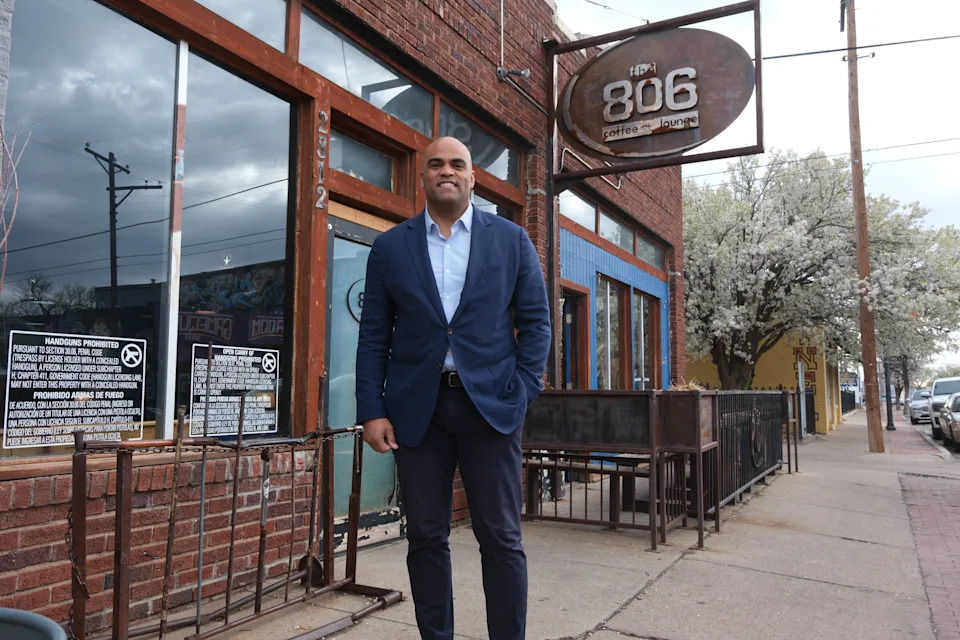U.S. Senate hopeful Colin Allred said Texas’ latest redistricting maps undermine democracy and weaken minority communities’ political power, calling them “incredibly destructive” during a brief interview with the Globe-News.
Allred, a former congressman and NFL player, is seeking the Democratic nomination for the seat currently held by Republican U.S. Sen. John Cornyn in the 2026 election. Cornyn, first elected in 2002, is running for a fifth term, and his campaign is already among the nation’s most closely watched races—especially with Texas Attorney General Ken Paxton launching a GOP primary challenge in April as a staunch Trump ally.

Allred previously faced U.S. Sen. Ted Cruz in 2024, losing 53.05% to 44.56%. Despite the defeat, he raised over $80 million and outperformed expectations in key Hispanic-dominant areas. His strong showing has cemented his status as a leading contender in 2026 and underscored the growing competitiveness of statewide Democratic campaigns.
Against that backdrop, Allred said partisan redistricting has only deepened divisions and made congressional districts less accountable to voters.
More: Cruz and Allred spar on abortion, immigration, economy: Summary of Texas debate for Senate
“This gerrymandering has broken Congress,” he said. “It produces extreme representatives who aren’t accountable. Some new districts are so bizarrely drawn, I don’t know where members will even put their offices.”
Allred pledged that, if elected, he would push for a national ban on gerrymandering by mandating independent redistricting commissions—a model used in states like California.
“We have to get away from politicians choosing their voters and return power to voters choosing their politicians,” he said.
More: Cornyn touts legislative wins from 'One Big Beautiful Bill' in Amarillo
He added that the new, proposed maps weaken majority-minority districts that have driven Texas’ growth.
“Every district that’s being targeted for removal was a majority-minority district,” Allred said. “That means less voting power and less voice in Congress for Black and Brown communities… these are the areas growing the fastest in Texas, and they are the ones that need representation the most.”
As an example, District 35—long majority-Hispanic—was redrawn to include more rural territory, diluting its urban voting power. Several federal lawsuits assert the maps violate the Voting Rights Act.
The map fight triggered a 15-day Democratic walkout in the Texas House. On Monday, the holdout ended when those Democrats returned to the Capitol, restoring the two-thirds quorum Republicans needed to push through new congressional maps designed to produce five more GOP-leaning seats ahead of next year’s midterms.
Within this high-stakes moment, Cornyn drew controversy by asking the FBI to help locate the missing legislators. Allred sharply criticized that decision, viewing it as an alarming shift in democratic norms.
“Whether you agree with them or not, quorum breaks are a legitimate tactic that have been used for centuries,” he said. “To suggest the FBI should be deployed against legislators is really dangerous.”
Allred also highlighted that his campaign will center on lowering costs for health care, child care, and housing—issues he said resonate deeply in Amarillo, where rising home prices have strained local families.
“As somebody raised by a single mother who was a public school teacher in Dallas, I know how hardworking people are struggling,” he said. “We’re in an affordability crisis, and people feel like they’re working harder for less.”
Allred visited Amarillo in July to meet with residents, part of his effort to reach voters outside the state’s major metropolitan areas. He said he plans to return again soon for his “Unrig Texas” town hall series, aimed at challenging what he calls a rigged democracy and economy.
Looking ahead to 2026, the stage is set for a politically charged contest. Cornyn retains strong establishment backing, while Paxton’s primary challenge has exposed divisions within Republican ranks. For Democrats, Allred’s 2024 campaign and shifting demographics suggest a potentially competitive race. The outcome will test whether Republicans can maintain their long-held dominance in Texas or if Democrats can gain ground in one of the nation’s most reliably red states.
This article originally appeared on Amarillo Globe-News: Democrat Senate candidate Colin Allred challenges Texas redistricting








Comments